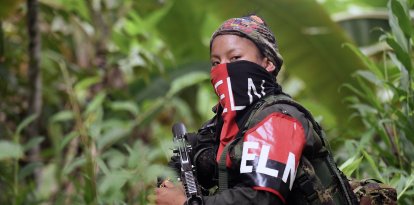Venezuelan criminal gang Tren de Aragua expands in South America
Although it operates openly and publicly in Venezuela, the autocrat Nicolás Maduro has not lifted a finger against it.

Image of a police operation against the Tren de Aragua in Chile / Chilevisión.
A Venezuelan criminal organization comprised of at least 5,000 criminals, known as the Tren de Aragua has expanded its domain in several South American countries. The country's security agents arrested 17 members of the gang in June of this year and charged them with drug trafficking, illicit association, possession of weapons and kidnapping, among other charges.
The arrest occurred after the eviction of 23 houses in a poor sector of Arica, in the extreme north of Chile, on June 16, when police found weapons, drugs and a buried corpse with signs of torture. The event shocked the locality. Chile's President Gabriel Boric declared: "I want them to know that we will pursue them".
The history of the Aragua Train
The criminal gang began operations approximately 10 years ago in the Venezuelan state of Aragua. The organization is led by Hector Guerrero Flores, alias "Niño Guerrero". He is currently incarcerated in Tocorón prison for multiple crimes, including homicide. The criminal organization operates from this prison. They are the ones who maintain total control of the premises, despite being under the theoretical custody of police agents. From prison, "Niño Guerrero" gathered his former collaborators and, together with other prisoners, set up the organization.
According to Luis Izquiel, a professor of criminology at the University of Venezuela, more than a decade ago the gang operated as a syndicate. The union organization "extorted contractors, sold jobs in the works of a section of the project for the construction of a local railroad. Since then they became known as the Aragua Train Workers"., explained in an interview with BBC World.
For Izquiel, it is difficult to know the exact number of members of the dangerous Venezuelan gang, but he estimates there may be between 2,500 and 3,000. However, Rona Rízquez, an expert on organized crime, estimates the number at 5,000 members, and they have a presence in Venezuela in 11 states. Rízquez is writing a book about the Aragua Train.
International branch of the organization
Rizquez explained to the publication The Clinic that the Aragua Train saw a business opportunity with the wave of Venezuelan migrants . They extorted them, used them for drug trafficking, and allegedly sexually abused some of them.
The band's first international activity that transcended to the press occurred in 2018 in Peru. The Robbery Investigation Division of the Peruvian police arrested five individuals who claimed to be"Los Malditos del Tren de Aragua". According to the prosecutor, they committed crimes against public safety for illegal possession of weapons and ammunition, dangerous materials and sale of drugs, among others.
In 2019, Olivian Junior, Secretary of Public Security of the state of Roraima in Brazil, denounced the presence in Pacaraima, a territory located on the border with Venezuela, of criminals who identified themselves as members of the criminal organization led by "Niño Guerrero". Since then, the band's activity has spread to several cities in Peru. On July 19, local police arrested four Venezuelan members on the tenth floor of a building in Lima.
In 2021 El País of Spain reported that 740 criminals from the Aragua Train form part of the First Capital Command in the border state , one of the largest criminal structures in Brazil.
In Colombia, Colombian border authorities have revealed that the group has an active presence and is fighting with other gangs and irregular groups, such as FARC-EP dissidents, to gain control of the drug trade, which has caused anxiety among the population.
In Chile, the members of the Tren de Aragua arrested in June of this year operated through their armed wing in that country, "Los Gallegos". It is presumed that the gang has around 100 men in the country, dedicated to extortion of migrants and human trafficking.
The head of the Anti-Narcotics and Organized Crime Prefecture North of the Chilean police, Rodrigo Fuentes, explained that the gang members "obey a leader.
explained that the members of the gang "obey a leader, they have people linked to the handling of weapons and others who are in charge of collecting money, known as vacunas". Acts of extortion are called "vaccines".
The Aragua train has a presence in the border zone between Chile and Bolivia, and it is believed they may also have cells on the border in Argentina, according to Ronna Rizquez. The researcher believes that they are expanding their activities to other territories in Latin America.
Chavismo coexists with crime
The Aragua train is the largest criminal organization in Venezuela and operates openly and publicly. But the autocrat Nicolás Maduro has not lifted a finger against it. The armed group has rifles, grenades, explosives and drone systems. In this context, the inhabitants of the Caribbean nation feel unprotected by the presence of the group that operates unchecked.
The Venezuelan regime has been accused by the U.S. Department of Justice of being a member of the Soles PosterIn this context, the total brazenness with which criminality acts in Venezuela is not surprising. Mafias and groups continue to proliferate, in turn laundering their image with a corporate and institutional facade.
In 2016 Venezuela's Minister of Penitentiary Affairs at the time, Iris Varela, posed in a photograph sitting on a bed next to the criminal leader in San Antonio prison on Margarita Island. An image that illustrates the reality of the vicious justice system that prevails in the country.

























